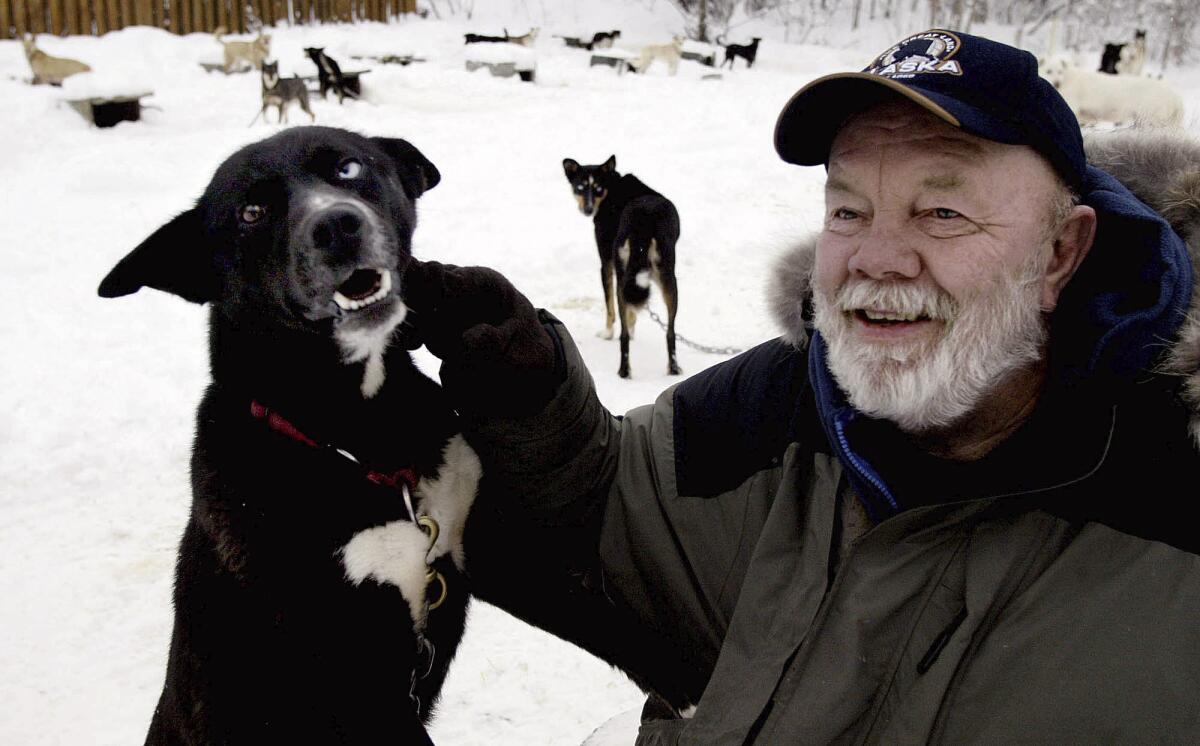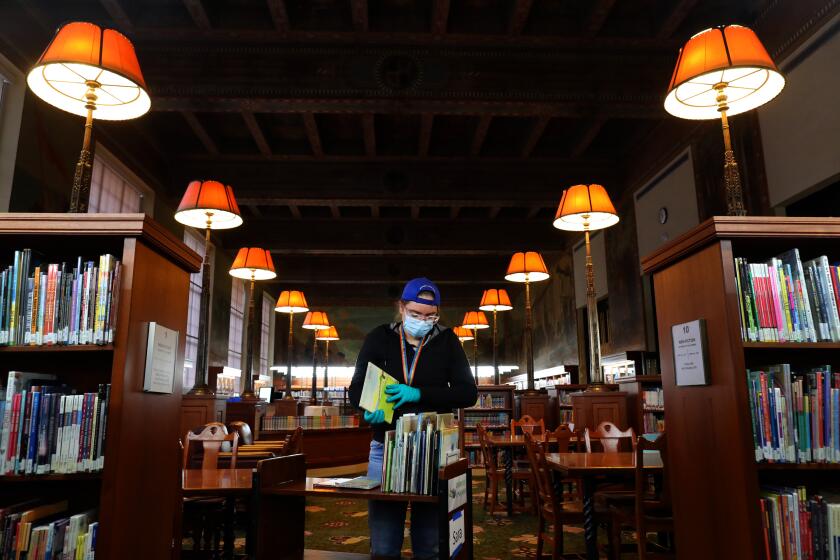On school reading lists, Gary Paulsen’s ‘Hatchet’ isn’t just required, it’s desired

- Share via
Damitri Boone read Gary Paulsen’s “Hatchet” for the first and last time more than 30 years ago, but she remembers it so vividly it’s as though she turned the last page yesterday.
“‘Hatchet’ was something that was so out of the ordinary,” said Boone, a children’s librarian at the Inglewood Public Library. “You never read about children struggling to survive on their own, and that’s something that stood out to me.”
Paulsen, the acclaimed and prolific author of page-turning children’s novels of adventure and survival, including “Dogsong” and “The Winter Room” as well as “Hatchet,” died suddenly last Wednesday at his home in New Mexico, the Associated Press reported. He was 82.
Teachers and librarians in Los Angeles and beyond were saddened by the news but expressed deep gratitude to a man whose inspiring, plot-driven stories captivated readers young and old. Throughout his life, Paulsen wrote more than 100 books, sold more than 35 million copies, and was a three-time John Newbery Medal finalist and a recipient of the American Library Assn.’s Margaret A. Edwards Award for lifetime achievement.
Children’s author Gary Paulsen dies, He wrote ‘Brian’s Winter,’ ‘Dogsong’ and ‘Hatchet’ novels
But “Hatchet” stands above the rest. Published in 1986, the novel is prevalent in middle school libraries and classrooms — a staple of curricula, student book clubs and personal recommendations aimed at both reluctant and avid student readers. It has become ubiquitous in spite of — or perhaps because of — its darkness, as far as middle-grade books go. The narrator of “Hatchet,” Brian Robeson, a 13-year-old boy from New York City, is on a flight to see his father for the first time since his parents’ divorce when the small propeller plane crashes. The sole survivor, Brian must fend for himself in the Canadian wilderness with only his clothing, a ragged windbreaker and a hatchet — a gift from his mother.
As Boone put it: “Brian is thrown from a safe and secure world into another almost instantly.”
In the span of 54 days, Brain slowly learns how to survive — how to make a fire, how to hunt and fish and forage, how to build a shelter. When the boy is finally rescued, he’s transformed into a more patient, mature and understanding person.
“It’s just so iconic and yet relatable,” said Maureen Palacios, owner of Once Upon a Time Bookstore in Montrose, “because people of course haven’t had that experience. But haven’t we all thought: ‘What could happen to us?’... People are always thinking that, kids especially. They have a vivid imagination.” Palacios called it a “survival story for the ages.”
That might have to do with its dual appeal to kids and the adults who tend to their reading. “Hatchet” teaches important lessons on resilience and resourcefulness under the guise of an irresistible adventure. It is recommended on the California Department of Education‘s reading list as well as dozens of websites aimed at finding books that kids really want to read, whether or not it’s assigned.
Unlike Boone, Darla Magaña and Mara Alpert first read “Hatchet” and Paulsen’s other work as adults.
Magaña, a school librarian at St. Margaret’s Episcopal School in San Juan Capistrano, was getting her master’s in library science when the novel was assigned in a literature class.
“I knew as a school librarian that this was a home run book, a book that would turn kids into readers for life,” she said. And she was right. “If a reluctant reader is sent to me, I would often hand them ‘Hatchet,’ especially guys, and it turned on a lot of them into reading.” It’s one of those books that generate a waiting list at the library. “It’s not a shelf sitter.”
“Hatchet” is also frequently checked out at the Los Angeles Central Library, where Alpert works as a children’s librarian.
“It’s a thrilling story and one that really captures the imagination,” said Alpert. “What if you were a passenger aboard a plane with just a pilot and something happened and the plane crashed and you had to survive on your own? It’s something that’s interesting and horrifying to think about.”
How did the L.A. Public Library help launch poet Amanda Gorman and teen punk group the Linda Lindas into the world?
Alpert still remembers the scene in which the plane is plunging toward the ground. “It’s very visceral.”
Ashley McArdle, a fourth-grade teacher at Turning Point School in Culver City, also believes “Hatchet” has expanded the worldviews of her students. “They realize just how far away from civilization Brian is,” she says — and that “the world has a lot of wilderness and there’s less stuff available at your fingertips.” She added that one former student was so inspired by the story, he wrote his own adventure book.
McArdle ascribes the book’s lasting impact to the escape it provides, in the person of one resilient boy, from the regimentation of the typical school day. “In a world where they have all these planned activities and schedules, it’s empowering for them to read about that freedom and realize what they’re capable of if they really set their minds to it.”
As educator Mary Cory put it: “It’s a low-stakes exposure to something that they’ve never experienced before.”
Cory is a sixth-grade teacher in Rockford, Mich., who taught “Hatchet” for years at James Jordan Middle School in Winnetka. “The kids always wanted to finish it before I did in class,” she said, laughing. She doesn’t teach the book to her current students, but they bring it up on their own. “The first thing one of my sixth-graders told me is ‘My favorite book is “Hatchet.”’”
Cory loved the novel’s action growing up, but it’s the characters — and the way Paulsen captures their emotions and experiences — that made her fall in love with it.
“‘Hatchet’ is all about survival and the relationships that you build,” she said. “Paulsen had a passion for identifying strength in people and building them up to be who they are.”
More to Read
Sign up for our Book Club newsletter
Get the latest news, events and more from the Los Angeles Times Book Club, and help us get L.A. reading and talking.
You may occasionally receive promotional content from the Los Angeles Times.









